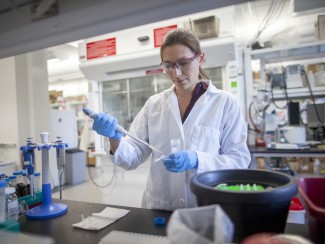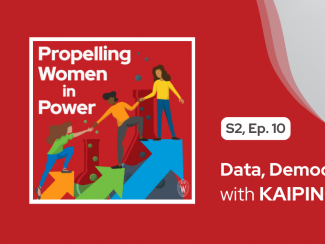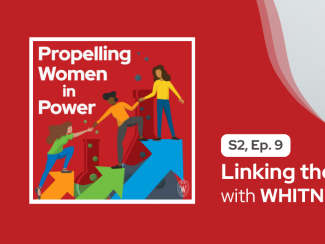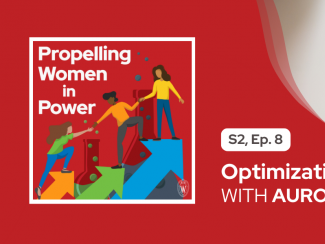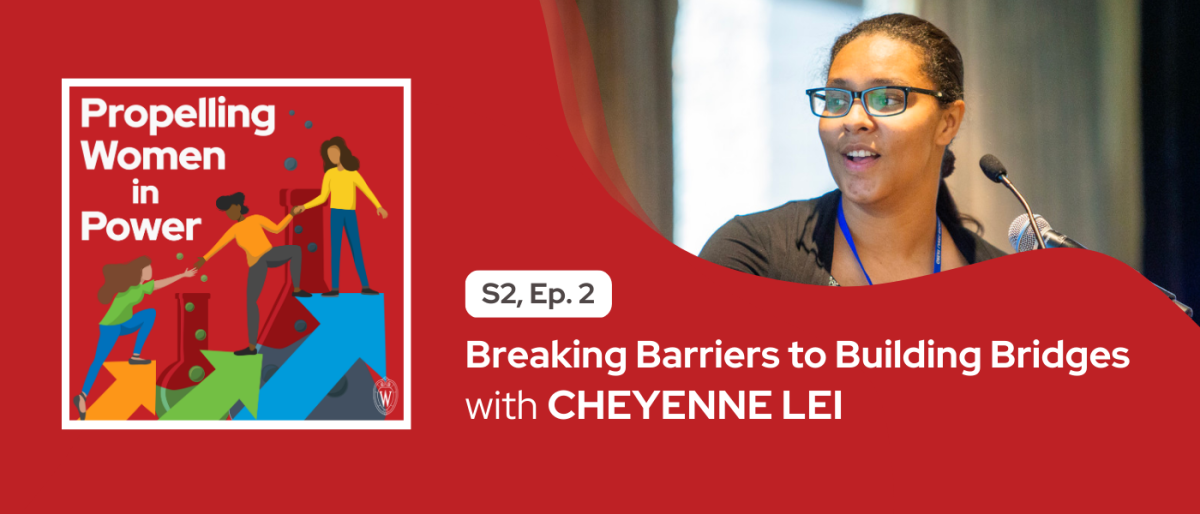
Rock-licking teen to two-time All American track athlete to albedo expert. Today's guest, Cheyenne Lei, Great Lakes Bioenergy researcher, shares how her path as an international student-athlete combined with her passion for field research and mentorship led her to a Ph.D. in geography at Michigan State University. Her work with albedo of bioenergy cropping systems in the GLBRC has inspired her current research studying the global warming effects of different agricultural practices as a research fellow at the University of Michigan. Her community-minded approach to science helps her speak the languages of high schoolers, farmers, and researchers while breaking the glass ceiling in field-based research and inspiring other international students like her to pursue their passion in science and academia.
Cheyenne Lei's current research at the Institute for Global Change Biology focuses on examining the differences in projected warming outcomes by integrating albedo–how much light gets reflected by different landscapes on the Earth's surface, and greenhouse gas feedbacks modeled from different landscapes. Cheyenne completed her Ph.D. in Geography at Michigan State University within the Landscape Ecology & Ecosystem Science (LEES) lab under the guidance of Dr. Jiquan Chen. She currently helps maintain over 15 micrometeorological towers focused on climate change in multiple unique ecosystems and teaches her research through scientific and public outreach.
Listen below or on Spotify, Apple Podcasts, Youtube, and anywhere you can find podcasts!
Credits
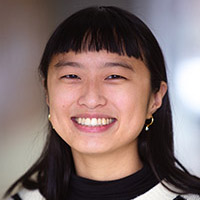 Michelle Chung | Host
Michelle Chung | Host
Communications Specialist
Michelle first joined the Wisconsin Energy Institute in 2019 as a student intern. She has since graduated and joined the communications team full time and continues to find creative ways to tell the stories behind the people and research here at WEI and GLBRC.
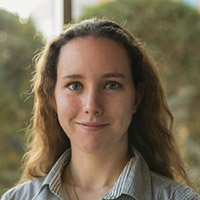 Mary (Meg) Riker | Host
Mary (Meg) Riker | Host
Science Writer Intern
Meg is an undergraduate civil and environmental engineering student who seeks to learn about the career experiences of a range of women in STEM.
Edited by: Michelle Chung
Produced by: Michelle Chung and Mary Riker
Music written and performed by: Mark E. Griffin
Transcript
Michelle Chung: From curious grade school kid to rock liking teen geologist to two time all-American track star and now top geographer. So goes the journey of today's guest, Dr. Cheyenne Lei, postdoctoral research fellow at the University of Michigan.
Meg Riker: She shared her path from the Caribbean to the U.S. and how she faced obstacles head on from defying the boundaries of field based research to the exclusion and discrimination she felt as an international and student athlete.
Michelle Chung: To the guidance she now gives to those inspired by her footsteps. We're extremely excited to share her story with you.
[MUSIC]
Meg Riker: From the Wisconsin Energy Institute and the Great Lakes Bioenergy Research Center. I'm Meg.
Michelle Chung: And I'm Michelle.
Meg Riker: And you're listening to Propelling Women in Power, a podcast about the careers of women in energy at the Wisconsin Energy Institute on the UW–Madison campus, and our sister institution, the Great Lakes Bioenergy Research Center. Let's get into it with Dr. Cheyenne Lei.
Cheyenne Lei: My name is Cheyenne Lei. I am a research fellow at the University of Michigan. I'm in the Institute of Global Change Biology. My pronouns are she and her. I connected through GLBRC because I just graduated from Michigan State University with my doctorate in geography and environmental sciences of work at the Kellogg Biological Station for the last five years, doing a research at the GLBRC and LTER sites.
These sites are large, agronomic, managed farmlands where they look at different types of landscapes, crops and how change through agronomic practices and anthropogenic activities changed the landscape over a short to long term periods. So I work with GLBRC with my research, which is looking at how solar radiation and how it is absorbed by different surfaces or reflected.
And that phenomenon is called albedo and how that change in albedo can either warm or cool the atmosphere or the surface over periods of time. They were looking at for someone to provide a synthesis project of global change biology, human environmental reactions at a much larger scale. And there's been many research projects that have been done at very small scales, very interesting, but you know, local field plot scales, my dissertation included.
But I've had the opportunity to take my research to University of Michigan and provide a working group and synthesis of all of these different types of research that has been done at multiple different places, at multiple different scale, such as like the local scale, the field scale, the tower scale, drone scale, landscape scale, the satellite scale and bring it all together to provide a synthesis of albedo and a global warming potential.
Michelle Chung: Do you think it was your time at GLBRC that inspired you to go that route of thinking big picture?
Cheyenne Lei: Yeah, most definitely. It was also before GLBRC and MSU. I really enjoyed doing research. I found that out from my undergraduate internship days where I was doing, you know, micro stream invertebrate assessments, water quality management, removing invasive species, looking at different changes upon the landscape. And I think that kind of fed into, you know, my master's program in hydrology and landscape changes at Western Michigan University and then into my Ph.D. at Michigan State University, where I was able to continue that same type of research with the help of the Kellogg Biological Station and GLBRC.
Michelle Chung: When this huge scope of your research. What excites you most about it?
Cheyenne Lei: I like that it is very interdisciplinary. I get to work with a lot of different people every day within my research, and it's always very new and evolving. A lot of different institute IPCC policymakers have realized that albedo and the how it affects the landscapes and global warming is very important, but has not been researched in a very wide detail.
And I like being able to be at the forefront of this new area that's coming up. And it's very important. It's very fast paced. And I also love I have a love for instrumentation and I get to work with that. Throughout my Ph.D. program, I was able to have the opportunity from my mentor, you know, to be able to create my own research project.
And from that, I was able to bring together, you know, micrometer logical towers and with sensors I wanted to work with. So when I talk about this to, you know, laypeople or, you know, to my family, it's not just, you know, I'm outside with sensors and all this gallivanting and fields, but at the end of the day, you know, what is the main use?
And a lot of people like to take out their phones to be like, okay, in the next 2 hours, it's going to rain. Well, the data coming from these sensors helps that out in a very indirect but relatable scale.
Michelle Chung: So you mentioned a little bit before your interest in landscape ecology, funneling into how you found your way to studying albedo, and like this big systems thinking. Where exactly was the origins? How did you find your passion for geography?
Cheyenne Lei: So when I was in high school, I came across a book for the Mount St Helens volcano in the U.S. and I thought it was super awesome. So I initially wanted to be a volcanologist because I thought volcanos were the bomb. HA!
Michelle Chung: Oh, that's a good one.
Cheyenne Lei: From there, you know, I kind of moved into geography because I had a passion for it and I really enjoyed it. And from there, I kind of branched out into a lot of field research. So I took up a lot of internship, which allowed me to be outdoors. And from there I was able to gain a foothold into, you know, landscape ecology, geography, the environmental sciences and how, you know, humans and the environment kind of interact with each other.
And I've kind of just taken it from there.
Michelle Chung: Was there a moment in there specifically where you just knew that research was what you wanted to do?
Cheyenne Lei: I guess when I was out in the field one day I was interning at the Huron River watershed, and we were out in Whitmore Lake taking some stream quality measurements. And I was just about to finish my undergraduate and start my master's program. But there were two other students who were also there just doing volunteer activities with the Huron River Watershed, and it was great being able to be like a mentor to them and show them, you know, this is what we do, you know, this is how to take the the width of the stream and the speed of the water.
And these are the plants to look out for for, you know, to show like the health quality of the stream. At one point, we had gotten lost and one of the volunteers was like, we need to go the other way. And like, actually, I'm a geographer. Trust me, we go this way and we made it out of the swamp alive with everyone intact.
And from there I think I really enjoyed research, you know, being able to explain the science to people in a way that, you know, the light bulb, the light bulb goes off. And they’re like AH! I understand that. That's great. Now I can put, you know, this together and that together, and it makes perfect sense. At Michigan State University, I've had over eight interns who I have mentored over the course of many years, as well as being able to attend many conferences, lectures to present my research.
And I really enjoy seeing the interactions with not only students and interns, but the public, such as farmers, as well as scientists, you know, from all different aspects of the research where you might not be the one doing the research, but the research still affects you, especially its outcome.
Michelle Chung: I think that is such a great viewpoint. When you think of research, oftentimes people think it's a lot less about like the communication between parties and like, especially since you included other stakeholders and who your research affects.
Cheyenne Lei: I get that a lot. People just say, So you're in an office, you know, just tapping away at a computer or you're in a very remote area, just, you know, gathering data. I'm like, Well, yes, you know, research is part of that. But being able to bring that research to the people that it matters to is also very important.
Michelle Chung: Yeah. And it's also a huge reason, motivating reason for you as a researcher, too. Like why does this matter?
Cheyenne Lei: It’s actually working! Yeah. Yeah, it matters. Yeah. If you understand it.
Michelle Chung: Yeah. Oh, my gosh. So you mentioned a little bit like one of those changing moments of how you knew you wanted to do research. Was you being able to mentor other people? I'm wondering in your own experience, did you have any mentors that led you on your way?
Cheyenne Lei: Yeah, I definitely had some mentors that was very integral in the path that I have taken when I was at MSU. My advisor, Jiquan Chen, he was very a very critical person in my field and helping me go up along the path that I am going today. He provided me an opportunity to to work with the GLBRC and the Kellogg Biological Station.
He was a mentor who helped give me advice on how to troubleshoot sensors and how to formulate my ideas and the pathways that I do in my research in landscape ecology and it being very, very helpful and also on an indirect scale– they have. I have also had a lot of mentors at the Kellogg Biological Station. The technicians at the Kellogg Biological Station have been also very integral in my research because I am usually on main campus or when something happens at the Kellogg Biological Station about an hour away.
A little difficult for me to get there. Like immediately. But the technicians there, the the professors there there have been also very helpful and provided me ideas because they're on the ground like they see the things happening in real time to, you know, be able to integrate into my research as well as other professors such as Dr. Philip Robertson, who was also on my committee.
But it was also a very important in helping me formulate my ideas and be able to present them very well to the community at conferences.
Michelle Chung: So mentors really just providing you those opportunities, being open to helping you troubleshoot things. Yes. I like how you mentioned the technicians, too, just people that are on your team, like on your side.
Cheyenne Lei: That they’re super helpful both at the Kellogg Biological Station and within my lab at Michigan State University, Landscape Ecosystems Lab. You know, just having those colleagues and those friends there who are like, Hey, you know, I have a great idea. I just you know, I think this would be a good idea to to implement within your study or what about using this sensor as well alongside this other sensor.
So having that other person who is other people who are also there to be provide like a different bird's eye view for your research to help make it as interdisciplinary and as reachable to as many audience– audiences as possible.
Michelle Chung: Yeah, that's awesome.
Meg Riker: So one of the things you said early on in the interview was that you interact with farmers and scientists and other people who are maybe outside of the realm that you have your expertise then as the engineering student and a future engineer, I think that's really important for people to like, do and like recognize, right? Because sometimes we get boxed into our own little like cells. I was wondering how you developed that perspective?
Cheyenne Lei: The research that, you know, scientist does is, you know, very, very important. But being able to bridge that gap within the research that we're doing and being and it being applicable to your farmers, you know, whether they're, you know, have a ten hectare plot or they have 100 hectare plot, you know, is very critical in kind of bringing that research that we that we know that we know to the masses.
So I can say after harvest, you know, we we notice in our research that cover cropping is a great alternative than to leaving the landscape bare. But if the farmers are not one doesn't have the information tool, doesn't have access to the information, then how would they know that a cover crop, you know, is more sustainable? Believe in the landscape better over the the winter season after harvest.
So being able to reach out to the community because you never know who will know someone that this information is also going to be very important for is very is often overlooked, underestimated and is very, very valuable. And being a scientist, it's always great to be able to, you know, provide your research at a layman persons level, you know, whether it's I'm talking to a high school class who is interested in a carbon dioxide measurements.
I'm I'm currently working with some students at the Battle Creek Math and Science Center who's interested in some of our research data and being able to understand and explain that research in a capacity that's still understandable to when I'm talking to other scientists at a conference or a consortium on the same topic. So I think this is also a very valuable skill that we need to do when we're reaching out to the community and being able to educate people on what we're doing as researchers.
Michelle Chung: So you've moved on to this awesome new position as a research fellow. What facilitated that decision?
Cheyenne Lei: So I have really great mentors in Dr. Robertson and Dr. Chen, who provided really awesome recommendation letters for me, but to the position I saw that they were looking at uh creating an institute which focuses on large scale effects of human environment interactions and the the scope of global climate change at a much larger scale. And I have done that research at Michigan State University for the last couple of years at a very small scale.
But my idea of providing a synthesis project at a much larger scale, let's say like the Midwest for farmers or, you know, the contiguous U.S. for a biofuel crops was something that they were very interested in. And they provide me provided me the opportunity to come to University of Michigan and expand on my research in a way that will not just focus on a really small area of albedo and global warming potential, but would affect different types of landscape through research and presentation.
Michelle Chung: Did you ever want to turn to a completely different field?
Cheyenne Lei: I guess I would have pushed that question from the opposite direction when I first started. You know, in high school and undergraduate, I always knew I wanted to do geography and geology, but I was rock licker because I love Rocks and stone so much.
Michelle Chung: Was that rock licker?
Cheyenne Lei: Rock licker! it's an endearing term for people who do geology and earth science. You know, you're dealing with the different types of minerals, you know, on the landscape. There are limestones are a sedimentary rocks, that sort of stuff. I was also very interested in that, and I wanted to be a volcanologist, so I didn't quite go that direction because it's it was very tough to do so.
But at the same time, I was still able to take my passion for physical geography and the landscape and kind of broached into another direction.
Michelle Chung: So it's like you didn't completely abandon that.
Cheyenne Lei: So not completely, but maybe, maybe one day I'll get to collaborate with a volcanologist and we'll do some really awesome research on like maybe how those lava flows have affected the landscape. And in turn, you know, the albedo of that landscape and global warming potentials, you know, warm and cool and who knows?
Michelle Chung: That's awesome. You say it and it shall happen.
What advice would you give to your younger self?
Cheyenne Lei: So I guess when I was younger, I was kind of a delinquent. Surprisingly, I found out from my friends when I came to the States that you actually graduate from having a good attendance record at school, so you can't just miss school and I did a lot of that when I was a kid. So my advice would be, you know, to stay in school, you know, be a little bit more passionate about, you know, thinking and going to school and being appreciative of the classes that, you know, are being taught.
As you know, as a teenager. You know, you know, teachers know what they're talking about and they understand that, you know, they're not going to be able to provide, you know, attention to every single student. You know, you need to be able to bring that for yourself. I would say to my younger self, you know, to be a little bit more passionate about being in school.
There are not a lot of opportunities for teenagers from where I grew up in the Caribbean to be successful and kind of went along the the athletic side of school. So I was always very active in track and field and basketball and chess, that sort of stuff. But that would take away from my in-class time. So I'd rather be doing that instead of being in the classroom.
And it's understandable because that's really difficult to, you know, get a higher education there. My advice would be, you know, there's still opportunities for, you know, academia, success, you know, as a teenager in the Caribbean. You know, if you work really hard.
Michelle Chung: What brought you to the U.S. and do studies here?
Cheyenne Lei: So I got a full athletic scholarship to study in the States. I'm a two time all-American in track and field, but I still had fairly decent grades. So I had the opportunity to come to the states, you know, study. But I've had a lot of my friends who did not have those opportunities to to get the foot in the door.
So, yeah, I definitely give my advice to my younger self. You know, if you had to do it again, you know, stay in class a little bit more. I, I've always been a foot in the door type of person, you know, even going into my master's program, when you know, initially they had said, well, we don't have any TAships are RAships to give you.
And I said, no, find one for me because I really want to do this, you know, as a career. And eventually they're like, yes, you know, we can provide you an opportunity to, you know, do your master's program with a funding tuition. But at the same time, when I was a young kid, I realized very quickly that the opportunities were very, very small and in between.
And that can make people hopeless. But I was kind of the other way around, whereas I want to prove everyone wrong. So here in the States, college coaches can come and view footballers and then like kind of like recruit from there. But when you're in a completely different country, it's a lot harder to like fly down and see the talent.
Whereas I put myself out there, I contacted universities and said, Hey, I've competed for my country, I exist, I want to come to the States and get an education. You know, if you can do it through an athletic scholarship, that would be great. And from there, you know, I was able to contact universities who were interested in, you know, and offering me a scholarship and giving me the opportunity to come to the states and learn, kind of branched out from there using what was then my talents as a delinquent teenager, which was sports to become a much more academically, you know, prone and inter-disciplinary person that I am today.
Michelle Chung: That is the beginning spark for finding those opportunities is advocating for yourself.
Cheyenne Lei: You know, there are people who have kind of followed in my footsteps using my examples since I have successfully gone on to graduate programs here in the States and I've had students, you know, from my home country reach out to meals, like give me your advice on how I can do the exact same thing. And I, I, you know, still take that mentorship.
You know, it might not be in my field, but I'm still helping other students and teenagers achieve their dreams of potentially, you know, getting an education and still, you know, doing sports as well.
Michelle Chung: Moving with all the pieces of what made you successful.
Cheyenne Lei: And integrating it myself, but help other people as well.
Michelle Chung: Yeah, no, that's great. And I'm one of the articles I found on you. It says that one of your hobbies is writing motorcycles for fun, and I think that's freaking awesome. I bet that's an awesome break from work. How did you get into it?
Cheyenne Lei: Kind of call it my happiness. It's my happy place. I find it as a place where I can decompress and, you know, at the end of the day, you know, some people, you know, like to read, some people like to go home and watch TV. Some people like to go to the bars. I like to get out of my motorcycle and like to go for a ride.
The feeling that I get when I'm riding is it's very hard to describe unless you've ever been on one. So you should definitely go on a motorcycle ride sometime.
Michelle Chung: You're inspiring me. I’m putting that on the bucket list.
Cheyenne Lei: And if I'm ever if I'm ever at UW sometime with my motorcycle, I'd gladly give you a ride.
Michelle Chung: Oh, my gosh. That’d be amazing.
Cheyenne Lei: Yeah, it's. It's a really great feeling or exhilaration. You're not thinking about other things that you're thinking when you're, like, driving your car home. Just you're. It's just you and the road. And so it's a really great feeling.
Michelle Chung: Yeah. Super mindful, the adrenaline. You're just flooding with all the good neurotransmitters.
Cheyenne Lei: Not thinking about the bad stuff or any stuff.
Michelle Chung: Yeah, you need things like that to balance your life. Yeah. That goes into my next question. How hard or easy do you think it is to balance your work and your personal life?
Cheyenne Lei: Well, since COVID is, I won't say over, but kind of like more normalized right now, it's a little bit better being able to manage my home and work life. It's been a little difficult since I transitioned into a new place, a new job, new location, as well as my husband lives about 6 hours away because he's also tenure track a professor at a different university.
So I do a lot of traveling back and forth to make sure that our home life does not suffer with our workplace, you know, while we're all pursuing our individual careers. But I think it's been a really great opportunity to expand on my my work career, expanded my research in landscape ecology and atmospheric physics. The balance has been a little tough with the traveling back and forth.
But I think with very tender love and care for for both of us and, you know, traveling back and forth of being each other, I think will do great.
Michelle Chung: What do you think are continuing obstacles for women in your field?
Cheyenne Lei: I think there are a lot of obstacles for women, especially acceptance of women within STEM programs. One great example would be my my micrometeorological towers requires, you know, really big Marine car batteries to function throughout the winter. So I went to an auto store and purchased about 12 batteries of those big car batteries. And I rolled up with a MSU vehicle you know, to bring them back to my my field sites and you know, the gentleman there was like, are you sure you're going to be able to lift all these by yourself?
Would you like some help? I ignored the first part and said, Yes, I would like some help. But then, you know, he picks up one car battery and he's shuffling along to the car while I pick up two car batteries, one in each hand. And we are let's do this. And his mouth just opened was like, Oh, I wasn't expecting that.
And it kind of brings forth like this analogy, you know, that women are not able to function, you know, in these very emasculated field studies. And I always enjoy breaking the barriers and showing them that women can do just as much or if not better. And, you know, these types of research, I'm not to say that, you know, one is better than the other, but I think that, you know, we should be able to show that there's equality and that one person should not belittle another person, you know, in the same area of research.
Michelle Chung: Yeah. Or come in with those expectations. Right. And having the expectation that you're going to do something. So I guess you kind of answered or gave one example to my next question. Do you see discrimination in academia?
Cheyenne Lei: I think I've encountered it a few times and I always try to stand up for myself in a very polite but firm way. At the same time, I use my experiences that I've had, such as the example that I gave to try and educate other people very gently that, you know, we should not have these gender gaps within anything that we're doing within my my mentor, my mentoring you know
I've made sure to mentor, you know, many different people throughout the years. But I've always had a lot of female students, especially international female students, who are also interested in becoming professionals in STEM careers. You know, I be very frank with them, You know that this is something that it's present. But yeah, you can be you can you can rise above it with you know, so determination and education and not only for yourself, but for the people around you as well.
Michelle Chung: So you've said you grew up in the Caribbean and last time we talked to the pre-interview, you said you just celebrated your first year of U.S. citizenship.
Cheyenne Lei: Which is awesome. Well, thank you.
Michelle Chung: And that you're also a student athlete at the same time. What was it like navigating school academia as an international student while also balancing being an athlete?
Cheyenne Lei: It was definitely very tough. I didn't have a lot of the support networks that, you know, other people will have, you know, coming into college, you know, like parents, advisors, high school teachers and mentors who have done the the typical, you know, four year program as international student, you're just thrown into the walls and hope you survive. And unfortunately, not a lot of people do.
A great example was I took an American history class as an undergraduate for my first semester because I didn't know better. And in the Caribbean, we learn about Caribbean history and European history. When I got into the classroom, the first question that the professor had was everyone go around talking about your favorite moment in history? And I stepped off a plane 48 hours ago.
I have no idea. So then the professor thought it was appropriate to pick on me for the rest of the semester asking me questions on American history. So it was a very, very difficult class, and I think the professor should have probably been a little bit more professional about that. And on that, you know, this is a big university.
He's going to encounter many different, you know, students from many different backgrounds. So that's like a one example of the difficulty navigate in academia. I also had the problem of having a very thick accent when I first arrived. I had a lot of people who weren't willing to put in the time and effort to listen to me, like actually sit down and understand what I'm trying to say.
So that was also very difficult. I learned very quickly to kind of adapt, unfortunately, which I shouldn't have had had to, if people were more a little bit accepting and accommodating. So I learned to to slow my talk and to enunciate better, even though English is my first language. So these are a lot of issues. You know, I grew up with navigating academia as an international student, and, you know, I always made sure, you know, I said to myself that you know, throughout my my years as a professor, as a teacher, as a researcher, the mentor, I'll make sure that other students will not have this issue.
I'm willing to take the time and effort to sit and listen to them and provide them advice on who to go home to go to if they need your questions answered. For example, if they're interested in doing a different field or they need an idea of like the best supermarket to just go buy groceries, simple things to make them feel accepted, not not as alone.
And if I don't know the answer, which sometimes I don't, I make a valid effort to, you know, point them in the right direction.
Michelle Chung: What was it like balancing as a student athlete? At the same time?
Cheyenne Lei: It was very tough. A lot of, you know, traveling as a student athlete to, you know, many different track meets and conferences. It's very tough. Fortunately, you know, in my junior year, my senior year, I had a very accommodating professor who who knew that I was traveling quite often and would be like, okay, here is your opportunity to go for the things that you missed in class.
These are the things that you you need to catch up on. And it was very great. At the same time, I also had, you know, many different professors who said, well, you know, it's your fault for being a student athlete. You need to, you know, make the extra effort to, you know, catch up in class. But at the same time, being a student athlete means you have different responsibilities that a typical student who's just coming to class does not have.
Fortunately, most of my professors were very accommodating. I went to Northern Michigan University for my undergraduate, and from that I've actually had a lot of other Caribbean students follow in my footsteps and go to Northern Michigan for their undergraduate as well, because they're they understand the issues that I've had to overcome. And I said, you know, there are very accommodating professors there who, you know, will help you along the way.
Even as a student athlete, they won't let you fall behind.
Michelle Chung: Man, I can't believe they said it's your fault. You're a student athlete. Like you’re a whole person, right? That’s terrible.
Cheyenne Lei: I can understand. You know, some people do have and I'll be very honest, some people do have, you know, different views of, you know, should athletes or maybe it's better that, you know, you just come to school to learn. But at the same time, not everyone has the opportunity to pay to come to school, to learn, you know, in-state tuition, which may be $5,000, is a lot more than international tuition, which is $25,000.
And not everyone is making, you know, minimum wage in other countries. So I think there are a lot of things that are unpacked in that statement that people don't think about, but they've also not been present to like, understand. So it's kind of hard for them to to glean into the difficulties of as a student athlete. So again, I'm always happy to educate people where needed.
Michelle Chung: How do you envision your field for women, say, in like a decade from now?
Cheyenne Lei: I envision the field, you know, for STEM, you know, within landscape ecology, geography, to expand within, you know, the next decade. I've already seen that kind of happen in with my interns, who the majority of them are women who are interested in sustainability, physical geography, landscape, ecology. And I believe that, you know, being able to to mentor them and point them in the right direction in these fields that are, you know, very difficult.
But, you know, they're willing to make that effort to, you know, become a professional in the STEM field is, you know, very important. And I'm always super pumped, you know, to see gender minorities, you know, all, you know, striving towards those fields that, you know, initially people used to say, you know, don't do it. It's very difficult to get into.
Michelle Chung: How do you think we should address those gender gaps in STEM?
Cheyenne Lei: I think reaching out departments, universities, being more acknowledging as well as diverse would be a good step and not just, you know, sending out a bulletin saying, hey, you know, we're diverse. You know, we want people of gender, minorities and people of color to join it, but actually make enhance effort, you know, through funding, through classes that relate to them, through research topics that are within their fields and an interest or within the locations that they originated from or topics that are taught that they can relate to and be able to provide a conversation and a discussion with versus things that are very niche within and not intersectional and into disciplinary.
So I think it is on the departments and the universities to be more diverse and accommodating for gender minorities, for women, for people of color to navigate these STEM programs a lot more better.
Michelle Chung: Yeah, I like how you mentioned like we talk about representation as a big motivator for people feeling like they're they're welcome in a place. Yeah. Included. And a big part of it is people bringing people that might look like you into your university, into the spaces that you want them to feel a welcome in. But having classes and the curriculum reflect all the people that exist, right?
Cheyenne Lei: Yeah, half of it is just, you know, bringing them there, you know, making them interested in, you know, physical geography and math and physics and biology. The other half is actually, you know, making it inclusive, you know, making them want to to to stay there, making them feel like they have a place within that professional, like development area that they're like, yes, I feel like I can contribute to this science, you know, through the classes that have been taught, through the discussions with people, through other people who are like me, who are here, and people that had the same interests as well.
[MUSIC]
Michelle Chung: And she just had like such an aura of coolness and also just extreme kindness. One particular thing that she brought up was not feeling like she belonged while she was an undergrad, coming from a different country and like being a minority. Part of that was that the space didn't seem inclusive. She talked about this experience where she took this history class and like being from a different country.
She never learned U.S. history. She faced discrimination because of that. I think this brings up a bigger topic. We are focusing a lot on recruiting, you know, making our spaces more diverse. And that's really important. But we're not putting as much of an emphasis on making those spaces inclusive. So that's where you you see attrition people leaving because you've advertised your organization, your institution, as a place that is extremely diverse.
You have people of color on your home page, but at your institution there may be like, aren't those support systems that would make someone feel welcome, not being a majority student.
Meg Riker: Developing space to foster a feeling of belonging? How can we do that?
Michelle Chung: Cheyenne– she brought up one thing. She wished that there was classes, you know, classes about cultures that were not just American. And that's one way just seeing your culture represented in the curriculum, that is a show that they see that you exist, right? And that's important. And I think something that's happening at UW–Madison right now, we have multicultural student centers, we have student centers for a lot of the different identities that the student population might have, and it's listening to those first establishing them, but then listening to those and making sure you're prioritizing that they continue to thrive and exist.
So I'm really glad that Cheyenne brought this up, and I thought it was a good point to end on. Yeah.
Meg Riker: Mm hmm. And that's our show for today.
Michelle Chung: Thank you to Dr. Cheyenne Lei, postdoctoral researcher at the University of Michigan. And thank you for everyone listening in. Please subscribe, rate review and share this podcast with friends.
Meg Riker: You can find the Wisconsin Energy Institute at Energy Dot Wisc dot Edu and the Great Lakes Bioenergy Research Center at GLBRC DOT ORG
Michelle Chung: This episode was produced by Michelle Chung and Meg Riker. We'll see you next time on Propelling Women in Power. What is your superpower?
Cheyenne Lei: Being able to take any type of instrumentation that's broken and make it work.
I've always had a lot of other scientists like email me- It was like, I am having issues with this sensor. Do you know what's wrong? So we kind of troubleshoot it together. So I think my superpower is being able to fix any instrument.

